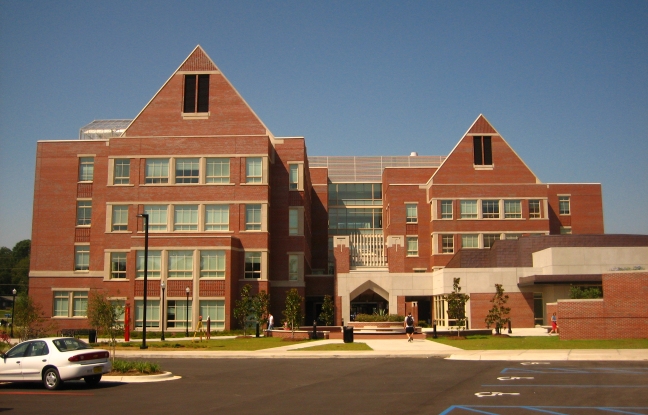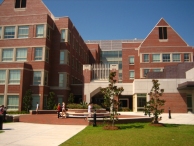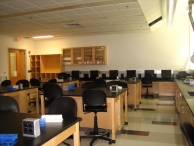New King Life Sciences Building Moves Department of Biological Science Mission Forward

After years of separation, the many areas of biological science have come together under one new roof to help drive the dynamic present and limitless future of biology research at Florida State University.
Located at 319 Stadium Drive, in the northwest quadrant of campus that has been transformed by 21st-century construction committed to science and medicine, the King Life Sciences Building brings together and supports the teaching, research and service missions of FSU's Department of Biological Science. Connected via underground tunnels to the adjacent College of Medicine and Department of Psychology buildings, the beautifully distinctive, state-of-the-art facility is the latest addition to the university's new nexus of interdisciplinary life-science education and research.
Completed in June 2008, the King Life Sciences Building consists of two bright, airy five-story wings connected by a two-story central lobby that draws the outside in and the occupants together.
The facility features a combination of low-sloped and steeply pitched roof areas designed to blend in with the Jacobean Revival architectural style throughout the rest of the campus. Between the eye-catching artwork in the main lobby that tells the department's history and the four greenhouses on the top floor, students attend lectures and laboratory classes; use computer laboratories; assemble in the 150-seat auditorium; meet with advisors, mentors and tutors; and conduct original research in specialized areas of biological science.


The building also is home to scientists who lead world-class research in cell and molecular biology, ecology and evolution, environmental science and physiology and neuroscience. They represent the commitment shared by their department and FSU's Pathways of Excellence initiative to increase the number of faculty who can bridge not only cutting-edge areas of biology but also other sciences and academic pursuits.
A growing group within the Pathways of Excellence "Integrating Genotype and Phenotype" faculty cluster epitomizes that commitment, according to biological science Professor W. Ross Ellington, FSU's Associate Vice President for Research. "This unique, highly interdisciplinary cadre of biological science faculty is seeking to better understand the connection between the information contained in the genetic material and the observable attributes of the fully developed organism," he said.
"For example, studies led by professor Hank Bass are focused on the packaging of genetic material into chromosomes and how that packaging influences the normal functioning of cells and the development of whole animals and plants," Ellington said. "Another study, led by Professor David Houle, is investigating the genetic basis for evolutionary change. Meanwhile, newly hired Professor Kim Hughes is examining genetic variability in organisms and the ways in which this variability influences such things as reproductive success and life span."
For all that research, an adaptable laboratory design in the King Life Sciences Building allows teaching labs to be converted to research labs as needed. Lab modules permit the easy reconfiguration of fume hoods, laboratory utilities and power to the benches. Core support areas are placed in the center of each floor, while most of the labs are situated around the outside to give researchers plenty of natural light from the large windows.
Then there's the building's "green" design, which incorporates both mainstream sustainable features and some extra ones required for LEED registration and eventual certification, such as bike racks and preferred parking spaces for low-emitting vehicles; landscaping with lower-water-demanding plant species; designation of open space adjacent to the project; low-flow shower heads, and an indoor air quality management plan.
The green theme goes through the roof, literally, to the biological science department's rooftop greenhouse complex, which is used for plant genetic research.
"This is an exceptional new physical environment," said Professor P. Bryant Chase, chairman of the department. "It gives us exciting new opportunities for teaching and working with students, conducting world-class research, and providing service to the university, the local community, the state of Florida and the scientific community."
